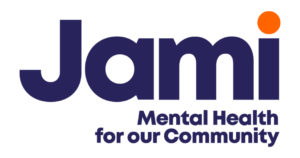
How can we help young people connect to themselves, the world, and to others? Emma Dorman, from Jami’s education team, explains how.
The theme for Children’s Mental Health Awareness Week 2023 is Let’s Connect.
But what does this mean?
The past few years have taught us the value of connection; particularly connection to each other. We know that as humans we need other people. We’re evolutionarily designed to seek community. Feeling connected to those around us fuels our mental health, providing a sense of security, comfort and wellbeing.
Connection to others is only one part of the picture. We also need to feel connected to ourselves. Young people are on a journey of self-discovery. Their formative years are a learning curve to answer the question: Who am I and what is important to me? Many of us continue to be on this journey throughout adulthood as life changes. A positive sense of self and upholding what we believe in, contributes to our wellbeing and our mental health.
Lastly, connection to the world around us is the third and final piece of the puzzle. We all need a place to feel safe. We need to live in a world that helps us thrive mentally, emotionally and physically. This includes the physical spaces we frequent, the people we interact with and the wider world and society.
So, how can we help our children and young people connect in all areas of their lives?
Connecting with others
Children learn from the people around them. They need to see the adults demonstrating care and compassion to others. We can help young people understand how we manage conflict too, by showing them how we use words to explain how we feel when someone says or does something that we do not like. When we demonstrate that conflict can be resolved, we are helping young people develop their resilience and life skills. Care givers can demonstrate this skill by restoring a sense of connection after conflict or disagreement. Conflict is a part of life. The key is to resolve it.
We can help reinforce behaviours that build connection, such as empathy, honesty, kindness and respect, by role modelling them and also praising children when they demonstrate them. We can give young people a place to feel heard and be understood.
Connecting with our self
We can empower children and young people to have a sense of individuality. Encouraging them to try out a variety of activities and grasp opportunities can help them gain a sense of what they do and don’t enjoy. It is also important to help young people become comfortable with expressing their thoughts, feelings and preferences.
We can help young people to find a sense of autonomy and independence too. This can be achieved by providing spaces for them to talk with each other alongside adults, and to think through problems and solutions rather than fixing or giving them the answer. By doing so, we build confidence in their skills and capabilities.
It’s also vital that children and young people understand their own identity and how it is the same and different from others, as this also helps them to understand that everyone is unique.
Connecting with the world
We want young people to feel safe and secure in the world around them and to feel grounded in the places they frequent and the people they meet. But connection to the world goes beyond this.
Contributing to the world is another great way to build connection. Explore options for young people to get involved in their local and wider community. Are there opportunities for them to volunteer? Are you speaking to your children about your values and about the importance of caring for others?
Lastly, ensure our children spend time in nature. This can include conversations around what they see when you’re out together in the park or on a country walk, or doing art or creative activities that include nature or gardening. For older kids, we can talk to them about climate change and conservation in an age-appropriate way. Give them a space to share their thoughts and feelings on the subject. And support them to feel empowered to make reasonable changes in our homes and communities. We know that contributing to our world and volunteering are excellent acts of self-care.
For parents and carers
If you are caring for a young person struggling with their mental health, contact our Carer and Family Support service for advice and support at www.jamiuk.org or call 020 8458 2223
Childline
24/7 Helpline and online chat for young people
Call 0800 1111
Papyrus HOPELINEUK
Confidential support and advice for children and young people experiencing suicidal thoughts. Call 0800 068 41 41, text to 07860039967 or email pat@papyrus-uk.org
Opening hours: 10am–10pm weekdays; 2–10pm weekends and bank holidays
Shout
24/7 crisis text service. Text Jami to 85258
YoungMinds
Practical support for young people and a dedicated, confidential helpline – call 0808 802 5544 or visit www.youngminds.org.uk




